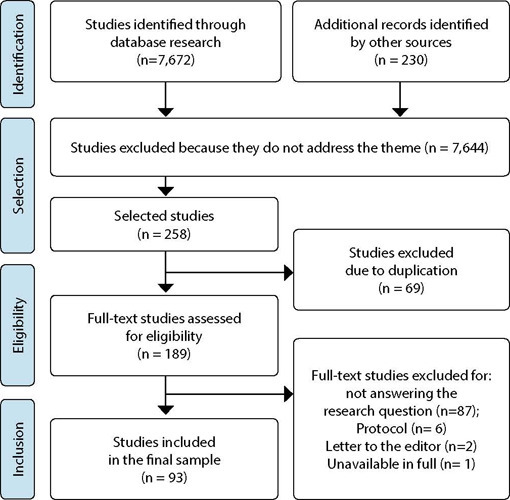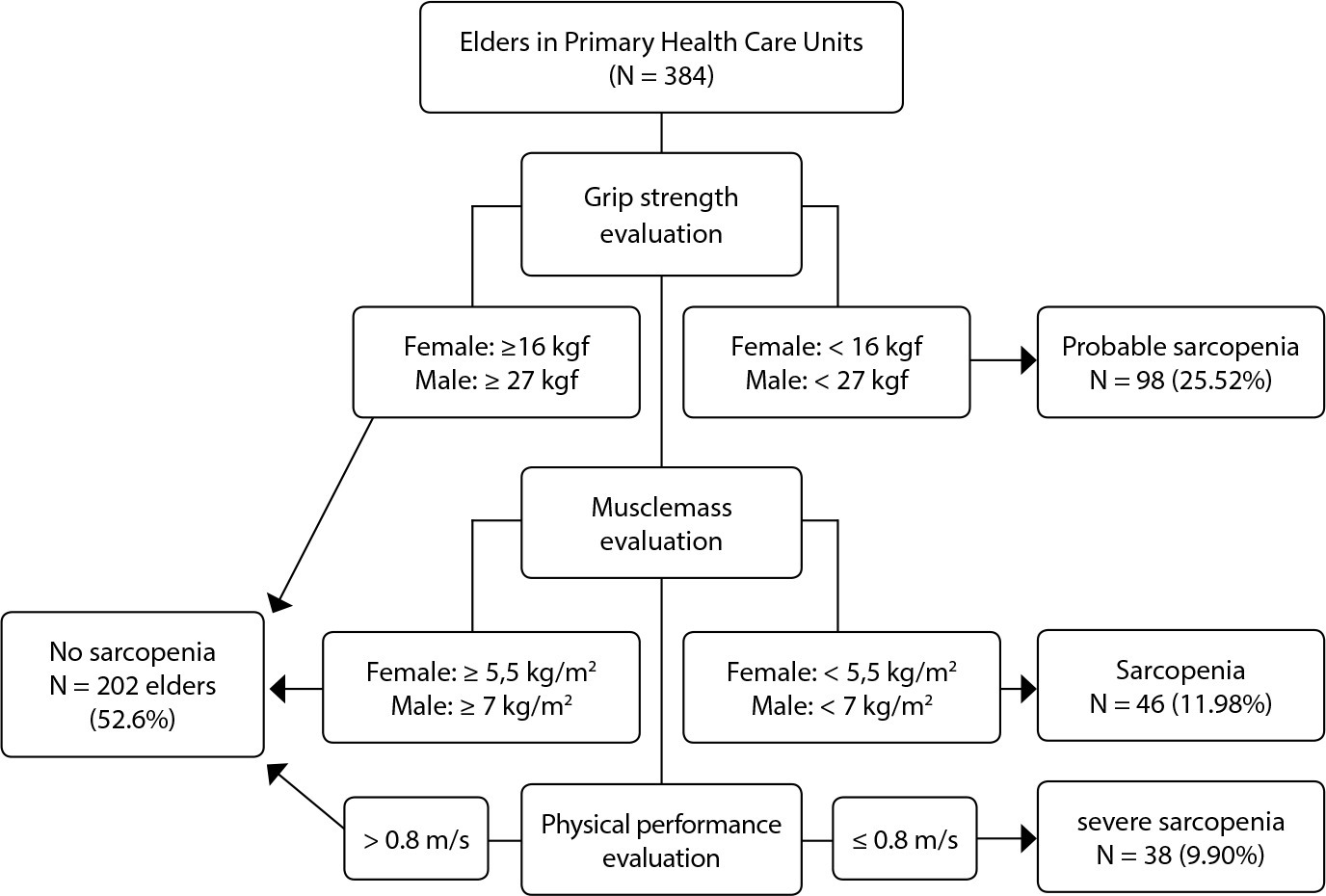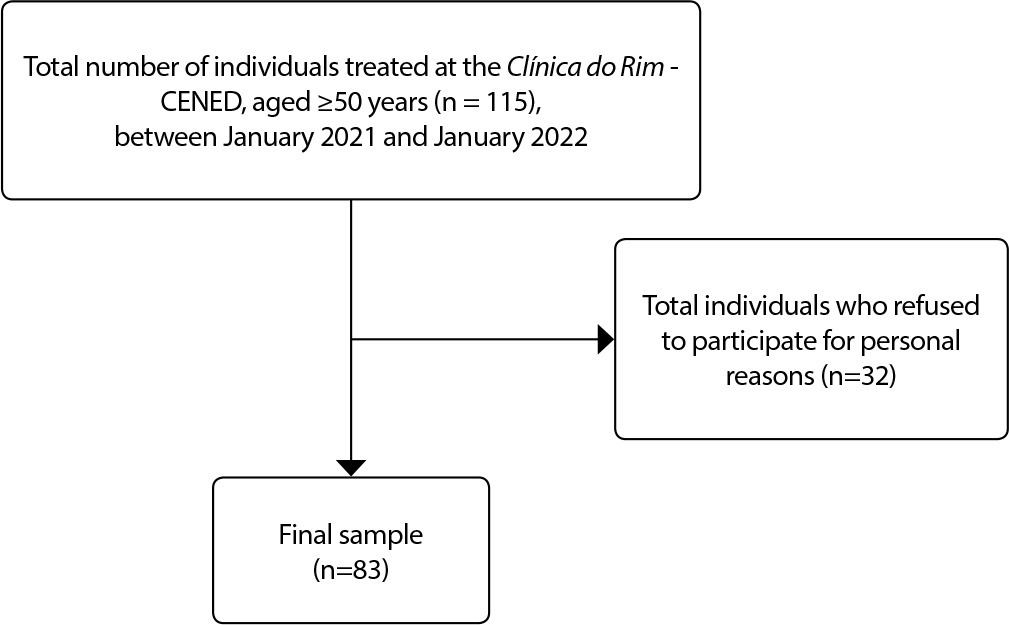-
ORIGINAL ARTICLE12-16-2024
Construction and validation of an educational game on biosafety in the central sterile supply department
Revista Brasileira de Enfermagem. 2024;77(6):e20230478
Abstract
ORIGINAL ARTICLEConstruction and validation of an educational game on biosafety in the central sterile supply department
Revista Brasileira de Enfermagem. 2024;77(6):e20230478
DOI 10.1590/0034-7167-2023-0478
Views0See moreABSTRACT
Objectives:
to construct and validate an educational game on biosafety in the Central Sterile Supply Department of a hospital in Curitiba, PR.
Methods:
the study was conducted using a quantitative approach, employing applied and technological research with an exploratory design. The process was divided into six stages, from the definition of the theme to the validation and application of the game. The study was carried out from May to August 2022, involving 17 nursing professionals from a Central Sterile Supply Department during day and night shifts, as well as 9 judges.
Results:
the study resulted in the construction of a board game named by the authors as “My Health First.”
Conclusions:
the research achieved its objective of constructing and validating an educational game. By reflecting on professional practice and correlating the occupational risks present, the professionals were able to list safe actions, identify problems, and seek solutions.

-
ORIGINAL ARTICLE12-16-2024
Health literacy development of Primary Health Care patients: qualitative research
Revista Brasileira de Enfermagem. 2024;77(6):e20240154
Abstract
ORIGINAL ARTICLEHealth literacy development of Primary Health Care patients: qualitative research
Revista Brasileira de Enfermagem. 2024;77(6):e20240154
DOI 10.1590/0034-7167-2024-0154
Views0See moreABSTRACT
Objectives:
to identify the process of health literacy development among primary care patients, relating it to their self-care practices.
Methods:
qualitative, prospective research with 22 patients from two Family Health Strategy units. Data were obtained through individual semi-structured interviews, examined through descriptive statistics and thematic content analysis.
Results:
the results discuss how participants learn about health and how this resonates in their behaviors, culminating in two thematic categories: “Health knowledge construction”; and “Dialogue between health knowledge construction and patient care actions”.
Final Considerations:
health knowledge is developed mainly through interpersonal relationships, mediated by health professionals through bonding and communication. Community educational actions and training of health professionals in communication can promote health literacy and self-care among patients.

-
ORIGINAL ARTICLE12-16-2024
Analysis of omission of antimicrobial doses in Intensive Care Units
Revista Brasileira de Enfermagem. 2024;77(6):e20240102
Abstract
ORIGINAL ARTICLEAnalysis of omission of antimicrobial doses in Intensive Care Units
Revista Brasileira de Enfermagem. 2024;77(6):e20240102
DOI 10.1590/0034-7167-2024-0102
Views0See moreABSTRACT
Objectives:
to analyze the rate of antimicrobial dose omission in intensive care units.
Methods:
cross-sectional study carried out between March 1 and September 30, 2023, in intensive care units of a University Hospital in Rio de Janeiro.
Results:
the sample consisted of 452 prescriptions and 1467 antimicrobial doses. The dose omission rate was 4.29%. Each antimicrobial prescribed increased the chance of omission by 51%. The strategy of double-checking prescriptions helped prevent 30% of antimicrobial dose omissions (p=0.0001).
Conclusions:
monitoring the omission of antimicrobial doses can guide nursing actions to improve quality and patient safety, contributing to the prevention of medication errors, antimicrobial stewardship and the fight against antimicrobial resistance.
-
REVIEW12-16-2024
Recommendations for guidelines for promoting mental health in the workplace: an umbrella review
Revista Brasileira de Enfermagem. 2024;77(6):e20240086
Abstract
REVIEWRecommendations for guidelines for promoting mental health in the workplace: an umbrella review
Revista Brasileira de Enfermagem. 2024;77(6):e20240086
DOI 10.1590/0034-7167-2024-0086
Views1See moreABSTRACT
Objectives:
to summarize the recommendations of guidelines for promoting mental health in the workplace.
Methods:
an umbrella review, according to Joanna Briggs Institute and Preferred Reporting Items for Systematic reviews and Meta-Analyses methodological assumptions. Data collection was carried out in January 2021 and updated in July 2023 in the American Psychological Association, Cochrane Library, EMBASE, National Library of Medicine, and Scopus databases. Systematic reviews that assessed guidelines with recommendations for mental health care for workers were included. PROSPERO registration CRD42023461845.
Results:
four systematic reviews published between 2015 and 2018 were identified. The abstracts highlighted actions that facilitate and inhibit the recommendations as well as three categories of intervention: primary prevention – worker protection; secondary prevention – promoting workers’ mental health; and tertiary prevention – supporting, monitoring and rehabilitating workers upon returning to work.
Conclusions:
the interventions are based on prevention, promotion and early recognition, support and rehabilitation of mental health problems.

-
ORIGINAL ARTICLE12-16-2024
Psychometric analysis of ProQOL-BR in nursing: building hospital safety and protection
Revista Brasileira de Enfermagem. 2024;77(6):e20240085
Abstract
ORIGINAL ARTICLEPsychometric analysis of ProQOL-BR in nursing: building hospital safety and protection
Revista Brasileira de Enfermagem. 2024;77(6):e20240085
DOI 10.1590/0034-7167-2024-0085
Views0See moreABSTRACT
Objectives:
to analyze the psychometric properties of the ProQOL-BR instrument in hospital nursing professionals.
Methods:
a methodological study to validate the ProQOL-BR. Confirmatory factor analysis, assessment of local and global adjustment quality, Pearson hypothesis testing and Cronbach’s alpha internal consistency analysis were used.
Results:
a total of 490 professionals participated. The model presents adequate quality due to factor weights (λ≥ 0.40), acceptable overall fit quality and adequate chi-square ratio and degrees of freedom (χ2/g.1=2.51) for the parameters of CFI (0.923), GFI (0.902), TLI (0.914) and RMSEA (0.042). In terms of validity, it was shown to be adequate with CC=0.89. The internal consistency obtained by standardized Cronbach’s alpha was 0.761. Criterion validity was shown to be favorable with significant correlations (0.001).
Conclusions:
the instrument was validated regarding content, criteria and reliability. Three questions were removed from the original instrument, ProQOL-BR, leaving the final instrument with 25 questions.

-
12-16-2024
GerenciaDOR™: development of digital technology by nurses for the assessment of patients with chronic pain
Revista Brasileira de Enfermagem. 2024;77(6):e20240050
Abstract
GerenciaDOR™: development of digital technology by nurses for the assessment of patients with chronic pain
Revista Brasileira de Enfermagem. 2024;77(6):e20240050
DOI 10.1590/0034-7167-2024-0050
Views0See moreABSTRACT
Objectives:
to develop a digital technological solution (prototype) for assessing patients with chronic pain.
Methods:
this is a methodological and technological development study based on the Human-Centered Design framework and the principles of Patient-Centered Care. The prototype guides patients through a body diagram and directs them to an evaluation using specific instruments that address the multidimensional aspects of chronic pain.
Results:
the GerenciaDOR* project enables navigation through the Web App screens, providing access to pain assessment features up to the presentation of results.
Final Considerations:
the study describes a systematic approach to pain assessment and expands nurses’ knowledge in pain management. Additionally, it can promote the development of other digital technologies for chronic pain assessment and contribute to a multidisciplinary, patient centered treatment.

-
ORIGINAL ARTICLE12-16-2024
Respectful care for postpartum women with sickle cell disease: a netnographic study
Revista Brasileira de Enfermagem. 2024;77(6):e20230545
Abstract
ORIGINAL ARTICLERespectful care for postpartum women with sickle cell disease: a netnographic study
Revista Brasileira de Enfermagem. 2024;77(6):e20230545
DOI 10.1590/0034-7167-2023-0545
Views1See moreABSTRACT
Objectives:
to analyze principles of respectful maternity care in narratives of postpartum women with sickle cell disease, relating them to Sustainable Development Goals.
Methods:
netnographic study, with two videos published in 2020. Deductive iconographic and thematic analysis by Respectful Maternity Care Charter, organized in MAXQDA.
Results:
principles identified were the right to: freedom from harm and ill-treatment; information, informed consent, refusal of medical procedures, and respect for their choices and preferences including companion; be considered a person from birth, with dignified and respectful treatment; health at the highest possible level; newborns being with their parents or guardians. The Sustainable Development Goals for women by 2030 were not positively contemplated in postpartum women’s experience.
Final Considerations:
it is appropriate that health workers qualify themselves to provide respectful maternity care, with qualified listening, understanding, and resolution of unique demands of postpartum women with sickle cell disease, seeking equality in care for women.

-
REVIEW12-16-2024
Strategies for expanding vaccination coverage in children in Brazil: systematic literature review
Revista Brasileira de Enfermagem. 2024;77(6):e20230343
Abstract
REVIEWStrategies for expanding vaccination coverage in children in Brazil: systematic literature review
Revista Brasileira de Enfermagem. 2024;77(6):e20230343
DOI 10.1590/0034-7167-2023-0343
Views1See moreABSTRACT
Objectives:
to identify the strategies found in the literature for increasing vaccination coverage among children in Brazil. It is justified mainly by the current scenario of falling vaccination coverage.
Methods:
systematic literature review. The search was carried out in the Pubmed (MEDLINE), Embase and Scopus databases, following the PRISMA guidelines.
Results:
initially, 4,824 results were returned. In the end, 6 studies were included for narrative synthesis using the SWiM methodology. Of these, 50% dealt with studies related to the Bolsa Família Program (PBF). The others explored strategies for approaching parents directly, Rapid Vaccination Monitoring (MRV) and the Community Health Agents Program (PACS). The PBF did not guarantee compliance with the conditionality of keeping vaccinations up to date. The MRV and PACS are effective strategies, especially because they allow active search for absentees.
Conclusions:
we conclude that more publications are needed on strategies to increase vaccination coverage among children in Brazil.

-
01-01-2016
Nursing care in Specialized HIV/Aids Outpatient Services
Revista Brasileira de Enfermagem. 2016;69(3):515-521
Abstract
Nursing care in Specialized HIV/Aids Outpatient Services
Revista Brasileira de Enfermagem. 2016;69(3):515-521
DOI 10.1590/0034-7167.2016690314i
Views1See moreABSTRACT
Objective:
to analyze the discourses about the care provided by nurses operating in Specialized HIV/Aids Outpatient Services in four public institutions of the city of Fortaleza, Ceará, Brazil.
Method:
descriptive and exploratory study with a qualitative approach, which used as a method the discourse analysis.
Results:
when titling the “care as negative”, such title came from the analogy proposed by Freud (1912) with the photographic negative, represented by what that care can configure from the unconscious movement, since nurses did not perceive themselves in the care actions developed by supporting the work of other occupational categories, contributing to maintain the ideology of biomedicine.
Conclusion:
it is necessary to justify and theorize a nursing clinical practice from epistemological issues of the profession, in such a way that nurses can understand their relevance within the care provided.
-
RESEARCH01-01-2017
Guide of attributes of the nurse’s political competence: a methodological study
Revista Brasileira de Enfermagem. 2017;70(3):526-534
Abstract
RESEARCHGuide of attributes of the nurse’s political competence: a methodological study
Revista Brasileira de Enfermagem. 2017;70(3):526-534
DOI 10.1590/0034-7167-2016-0483
Views0See moreABSTRACT
Objective:
To build and validate a guide of attributes of the nurse’s political competence.
Method:
Methodological research. This study comprised the construction of the instrument through literature review; experts validation of pre-established attributes for composing the guide; and clinical validation in the nurses work environment/reality. The data collection took place in the months from August to October 2014, and the analysis was based on the content analysis of Bardin and use of Epi info 3.5. All ethical precepts have been complied with.
Results:
From 29 attributes found in the literature, 25 have been validated by experts. Clinical/practical validation involved the participation of 43 nurses, who observed that the attributes are not articulated with the professional practices developed by them.
Conclusion:
The attributes of the nurse’s political competence were identified with support of literature. It is concluded that the professionals still have limited and fragmented perception of political competence, expressing difficulty/limitation.
-
ORIGINAL ARTICLE06-16-2021
Direct cost of Peripherally Inserted Central Venous Catheter insertion by nurses in hospitalized adults
Revista Brasileira de Enfermagem. 2021;74(2):e20190663
Abstract
ORIGINAL ARTICLEDirect cost of Peripherally Inserted Central Venous Catheter insertion by nurses in hospitalized adults
Revista Brasileira de Enfermagem. 2021;74(2):e20190663
DOI 10.1590/0034-7167-2019-0663
Views0See moreABSTRACT
Objectives:
to analyze the average direct cost of PICC insertion by nurses.
Methods:
this is a unique case study with a quantitative approach. The observation took place in a public hospital, collecting information on inputs used and procedure length. For the calculation of costs, time was multiplied by nurses’ costs plus supplies. The US dollar was used to present the calculations. In the analysis, descriptive statistics of measures of central tendency and variability were used.
Results:
the sample corresponded to 139 observations. The average cost of PICC insertion totaled US$286.04, with 90.8% of materials, mainly catheter, and 9.2% of the labor. The procedure took an average of 50 minutes, at US$0.26 per minute for nurses. Conclusions: the average direct cost of PICC insertion was US$286.04, with emphasis on the catheter. The results can support management decisions for adequate material and professional sizing.
-
REVIEW02-06-2023
Elements for assistance to patients with hematological malignancies to propose care lines: a scoping review
Revista Brasileira de Enfermagem. 2023;76(2):e20220152
Abstract
REVIEWElements for assistance to patients with hematological malignancies to propose care lines: a scoping review
Revista Brasileira de Enfermagem. 2023;76(2):e20220152
DOI 10.1590/0034-7167-2022-0152
Views0See moreABSTRACT
Objectives:
to identify the elements for assistance to patients with hematological malignancies to propose a care line.
Methods:
this is a scoping review, anchored in the JBI theoretical framework, with searches carried out in April 2021, in eight electronic databases and 10 repositories of theses and dissertations.
Results:
the final sample consisted of 93 studies, and the main forms of assistance provided that can support a care line for this public were imaging tests, immunophenotyping, chemotherapy regimens, radiotherapy, infection management, assessment of nutritional status, maintenance of oral function, symptom management and screening for second malignancies.
Conclusions:
the elaboration of a care line for onco-hematologic patients is necessary, considering the complexity surrounding the diagnosis and treatment of hematologic malignancies, in addition to the difficulties that are imposed in relation to access and continuity of care in the network.

-
ORIGINAL ARTICLE03-27-2023
Prevalence of characteristics associated with sarcopenia in elders: a cross-sectional study
Revista Brasileira de Enfermagem. 2023;76(2):e20220209
Abstract
ORIGINAL ARTICLEPrevalence of characteristics associated with sarcopenia in elders: a cross-sectional study
Revista Brasileira de Enfermagem. 2023;76(2):e20220209
DOI 10.1590/0034-7167-2022-0209
Views0See moreABSTRACT
Objectives:
to identify the prevalence and characteristics associated with sarcopenia in elders in Primary Health Care Units.
Methods:
cross-sectional study with 384 elders. To evaluate sarcopenia, we measured: strength and muscle mass, and physical performance. The elderly were classified as having: probable sarcopenia; sarcopenia; or severe sarcopenia. The chi-squared test and the multinomial logistic regression method were used.
Results:
the prevalence of probable sarcopenia was 25.52%; of sarcopenia, 11.98%; and of severe sarcopenia, 9.90%. Probable sarcopenia is 1.75 times more prevalent in men; osteoporosis is 2.16 times more prevalent in people with severe sarcopenia; polypharmacy is 1.57 times more likely in individuals with probable sarcopenia; and calf circumference below 31 cm is 2.24 times more likely in patients with sarcopenia and 2.19 times more likely in patients with severe sarcopenia.
Conclusions:
the highest prevalence was of probable sarcopenia, and the characteristics associated with sarcopenia were sex, osteoporosis, polypharmacy, overweight, obesity, and calf circumference.

-
ORIGINAL ARTICLE10-09-2023
Independent and combined effects of lifestyle behaviors on adolescent health-related quality of life
Revista Brasileira de Enfermagem. 2023;76(4):e20220780
Abstract
ORIGINAL ARTICLEIndependent and combined effects of lifestyle behaviors on adolescent health-related quality of life
Revista Brasileira de Enfermagem. 2023;76(4):e20220780
DOI 10.1590/0034-7167-2022-0780
Views0See moreABSTRACT
Objective:
To investigate the independent and combined effects of lifestyle behaviors, including physical activity, sedentary behavior, sleep duration and food intake, in the health-related quality of life (HRQoL) of Brazilian adolescents.
Methods:
Cross-sectional school-based study, with the participation of 306 adolescents aged 14 to 18 years. A questionnaire was applied with structured questions to collect lifestyle behaviors data. Perception of the HRQoL was identified using the Kidscreen-27. The study used covariance analysis and linear regression models for statistical analysis.
Results:
Adolescents who reported ≤ 2 hours/day of screen-based sedentary behavior and sleep duration equivalent to 8-10 hours/night presented significantly higher HRQoL. Adolescents who reported joint adherence ≥ 3 healthy lifestyle behaviors demonstrated approximately two [OR=2.12] to three times [OR=3.04] more chance of presenting higher perceptions of HRQoL.
Conclusion:
Although healthy lifestyle behaviors had a positive independent effect on HRQoL, joint adherence to healthy behaviors enhances the cumulative effect.

-
ORIGINAL ARTICLE12-04-2023
Assessment of the components of sarcopenia and quality of life perceived of individuals on hemodialysis
Revista Brasileira de Enfermagem. 2023;76(6):e20220677
Abstract
ORIGINAL ARTICLEAssessment of the components of sarcopenia and quality of life perceived of individuals on hemodialysis
Revista Brasileira de Enfermagem. 2023;76(6):e20220677
DOI 10.1590/0034-7167-2022-0677
Views1See moreABSTRACT
Objectives:
to evaluate the prevalence of sarcopenia in individuals aged 50 years or older on hemodialysis; to verify the association between sarcopenia and sociodemographic, clinical, anthropometric factors, components of sarcopenia and quality of life (QoL); and to correlate the components of sarcopenia with QoL.
Methods:
Participated 83 individuals on hemodialysis. Sarcopenia was established according to the current European consensus. Dynamometry to determine strength, calf circumference (CC) and appendicular skeletal muscle mass index (ASMMI) to obtain muscle mass and gait speed (GS) for physical performance. For QoL used the WHOQOL-bref.
Results:
the prevalence of sarcopenia was 32.6% (CC) and 18.1% (ASMMI). There was no association between sarcopenia and QoL. Both handgrip strength (r=0.25) and GS (r=0.36) showed a correlation with physical domain.
Conclusions:
sarcopenia was expressive, and the aspects of functionality determine the physical impairment in this population.

-
12-04-2023
Sleep quality of nurses who worked in coping with COVID-19: an integrative review
Revista Brasileira de Enfermagem. 2023;76(6):e20230007
Abstract
Sleep quality of nurses who worked in coping with COVID-19: an integrative review
Revista Brasileira de Enfermagem. 2023;76(6):e20230007
DOI 10.1590/0034-7167-2023-0007
Views0See moreABSTRACT
Objective:
to analyze sleep quality of nurses who worked coping with COVID-19 in scientific evidence.
Methods:
an integrative review, carried out in seven databases, including studies between December 2021 and June 2022, without language restrictions. The sample consisted of 15 primary studies.
Results:
nurses working in hospital, intensive care, outpatient care and teaching institutions constitute a vulnerable group for sleep disorders: latency, duration, efficiency and quality. The disorders identified involved insomnia at varying levels of severity: daytime dysfunction and morning sleepiness. Night work and low capacity for self-care were determinants of impaired sleep patterns.
Final considerations:
the COVID-19 pandemic contributed to greater vulnerability of nurses to changes in sleep, requiring strategies for risk management and well-being promotion.

Search
Search in:
Nuvem de Tags
Adolescente (85) Atenção Primária à Saúde (239) COVID-19 (91) Criança (91) Cuidados de Enfermagem (269) Educação em Enfermagem (151) Educação em Saúde (139) Enfermagem (930) Enfermagem Pediátrica (86) Estudantes de Enfermagem (77) Estudos de Validação (131) Família (87) Idoso (208) Promoção da Saúde (99) Qualidade de Vida (104) Saúde do Trabalhador (86) Saúde Mental (145) Saúde Pública (82) Segurança do Paciente (150) Tecnologia Educacional (100)



